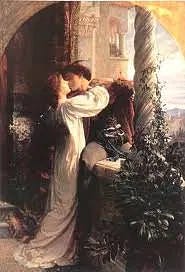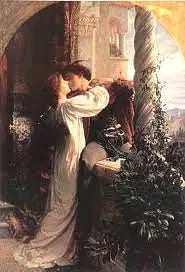Hello, all!
Between midterm projects and spring break, it's been a while since we have ventured into Chaucerian lands and poems together. We’re back again with Troilus and Criseyde, reading through Books II and III. Both of these parts pack quite a lot of twists and turns as Pandarus, the couple’s middleman, goes his best to bring a face-to-face meeting to fruition. There are schemes, garden strolls, and letters sealed with tears throughout Book II to bring us to the moment we’ve been anticipating in Book III: Troilus actually, finally meeting Criseyde.
Now, I will be honest: my expectations for a magical kind of reaction were low. While I know we vaguely touched on Troilus’s experience of seeing Criseyde from a distance and falling madly in love–and, since that moment in Book I, Criseyde having a similar reaction to Troilus’s appearance in Book II, though arguably not as strong–I thought it would be something lighthearted, perhaps with a joke or two thrown in by Pandarus to ease any kind of tension. After all, these are, at best, two strangers. A prince and a widow. A man who has loudly and openly criticized Love. A woman who has been abandoned by her father and left almost totally alone and unprotected. Citizens of a besieged city, with only their middleman as a common tie.
Imagine my surprise then, when reading Troilus’s reaction to having Criseyde before him in lines 92-98:
In chaunged vois, right for his verray drede,
Which vois eek quook, and therto his manere
Goodly abaist, and now his hewes rede,
Now pale, unto Criseyde, his lady deere,
With look down cast and humble yyolden cheere,
Lo, the alderfirste word that him asterte
Was twies, “Mercy, mercy, sweete herte,”
Remember: this is a prince of Troy, a fearsome foe for the Greeks he faces in battle. Yet, here he is: shy, face red, voice trembling. And the first word he can get out before Criseyde? Mercy. His fellow soldiers may not have even recognized him!
While he was a bit dramatic at the start with his love sickness symptoms in Book I (locked up in his chamber, unable to sleep or eat, I’m sure you recall), this was not what I was expecting at all from Troilus. There is a kind of tenderness here; after many discussions and letters of wanting to meet, Criseyde actually both took his breath away and nearly struck him dumb, just by meeting him! It also plays a bit into Troilus’s youth, and perhaps a bit of innocence that still remains, even though he is a warrior.
He does recover a bit of his speech in lines 100-112:
The nexte word was, “God woot, for I have,
As ferforthly as I have had conninge,
Been youres al, so God my soule save,
And shal til that I, woful wight, be grave;
And though I dar ne can unto you plaine,
Ywis, I suffre nought the lasse paine.
Thus muche as now, O wommanliche wif,
I may out bringe, and if this you displese,
That shal I wreke upon myn owene lif,
Right soone, I trowe, and do youre herte an ese,
If with my deth youre wrathe may apese.
But sin that ye han herd me somwhat saye,
Now recche I never how soone that I deye.”
Back again with some more dramatics, as expected from the Troilus we’ve been introduced to. Though I didn’t have him pledging his life immediately upon first meeting on my radar, it fits his character: brave, brash, bold, and a bit impulsive. He does say that he would rather die than upset Criseyde–and this is before she has even told him her favorite color or what would, in fact, displease her.
That being said, it is refreshing to see a male character being so eager and open to expressing his thoughts and feelings, as opposed to him either never saying anything romantic or finally having a revelation after it is far too late. I’ll be interested to see where Troilus’s passion for Criseyde takes him–for his benefit or not, the tale will soon tell.
What do you think of Troilus and Criseyde’s first meeting? Do you prefer reading male characters who have their hearts on their sleeves or more of the strong, brooding type? Let me know your thoughts (and maybe a favorite leading man or two!) below.
Until next time!





Once again, this great expression of emotion is a huge gender role reversal. Women would traditionally be thought of as the highly expressive ones, not men. I think this avowal of emotions ties in nicely with the point Jay made in his substack post about Troilus fainting- it is unique, and draws attention to Troilus's unique character. These two substacks read nicely together, and complement the individual arguments you are each making. Troilus becomes a more and more unique character, and this is only the beginning- much more craziness still yet to come!
"Mercy, mercy"... you're right, men who knew Troilus in battle wouldn't recognize him here! I think Chaucer very intentionally selected Troilus' words to Criseyde, since Troilus would never plead for mercy on the battlefield. It helps to set up, like you pointed out, the double "battlefields" of war and love.
When I read about their first meeting, I made some notes about the way Troilus waxed neither quick nor dead, but only grew red. One thought is about the Biblical allusion that Jesus will return to judge the quick (or living) and the dead (from 2 Timothy and also the Apostles Creed). Why does Chaucer use that same language? Was it a popular turn of speech back then, or is there something more there? I really do not know.
But my initial reaction to Troilus seeing Criseyde, was that he isn't as dramatic as some other moments. He doesn't become very animated, and he doesn't faint as he does later (Jay's post on this was great!). He only blushes...and then proceeds with his customary dramatic-ness once he opens his mouth. I think I enjoy male characters who can express themselves but retain an air of mystery rather than hopeless naiveté.